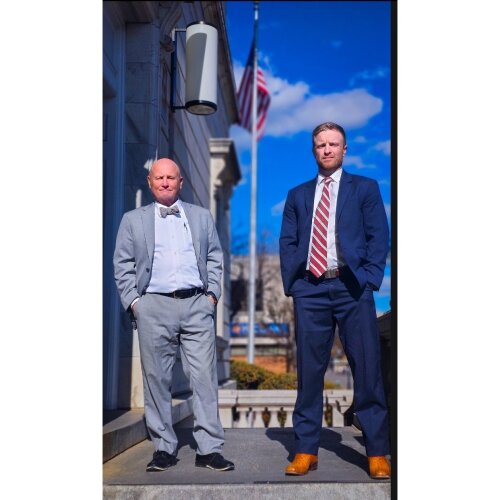Best Wrongful Death Lawyers in Alabama
Share your needs with us, get contacted by law firms.
Free. Takes 2 min.
Or refine your search by selecting a city:
List of the best lawyers in Alabama, United States
About Wrongful Death Law in Alabama, United States
Wrongful death law in Alabama allows the family or personal representative of a deceased person to pursue a legal claim when someone’s death has been caused by the wrongful or negligent actions of another person or entity. The purpose of these laws is to provide a remedy for the survivors of the deceased by holding responsible parties accountable and seeking monetary damages. Unlike some other states, Alabama’s wrongful death statutes are unique in the way they handle damages and eligibility for claims.
Why You May Need a Lawyer
Losing a loved one is devastating, and handling complicated legal processes during such a difficult time can be overwhelming. You may need a wrongful death lawyer if:
- You believe someone’s negligence or misconduct caused your loved one’s death (such as in car accidents, medical malpractice, workplace incidents, or dangerous premises).
- The circumstances surrounding the death are unclear and need investigation.
- Insurance companies are denying your claim or offering an inadequate settlement.
- There is potential for multiple parties to be liable for the death.
- You need to file a lawsuit within the strict time limits set by Alabama law.
Lawyers experienced in wrongful death actions can help gather evidence, negotiate with insurance companies, properly value your claim, and represent your interests in court if necessary.
Local Laws Overview
Alabama has several important laws that affect wrongful death cases:
- Who Can File: In Alabama, only the personal representative of the deceased person’s estate can file a wrongful death lawsuit. Family members cannot file directly unless they are also the personal representative.
- Time Limits: The statute of limitations for filing a wrongful death claim in Alabama is generally two years from the date of death. Failing to file within this period usually results in losing the right to bring the claim.
- Damages: Alabama focuses solely on punitive damages for wrongful death claims. This means the purpose is to punish the wrongdoer rather than compensate the family for losses like lost wages or companionship. No compensatory damages for pain and suffering, medical bills, or loss of income are awarded in these cases.
- Beneficiaries: Any recovery from a wrongful death lawsuit in Alabama is distributed to the heirs of the deceased according to state intestacy laws, not to the estate itself.
- No Survival Action: Alabama does not allow survival actions, which means claims for pain and suffering of the deceased before death cannot be brought if the person died immediately as a result of the incident.
Understanding these unique aspects can be challenging, so consulting a knowledgeable attorney is highly recommended.
Frequently Asked Questions
What qualifies as wrongful death in Alabama?
Wrongful death in Alabama occurs when someone dies as a result of the wrongful act, omission, or negligence of another person, company, or entity. Examples include car wrecks, medical negligence, workplace accidents, and defective products.
Who can file a wrongful death lawsuit in Alabama?
Only the personal representative of the deceased person’s estate has the authority to file a wrongful death claim in Alabama. This is usually appointed in probate court.
What damages can be recovered?
Alabama wrongful death claims only allow for punitive damages with the aim of punishing the wrongdoer, rather than compensatory damages for monetary losses or emotional suffering.
How are damages distributed?
Any monetary award from a wrongful death lawsuit is distributed to the deceased’s legal heirs according to Alabama’s intestate succession laws.
Is there a time limit for filing a wrongful death lawsuit?
Yes. In most cases, a wrongful death lawsuit must be filed within two years of the date of death. Missing this deadline usually bars the claim.
What if the deceased contributed to their own death?
Alabama follows the strict rule of contributory negligence. If the deceased person is found to be even slightly at fault for their own death, their family cannot recover damages.
Can a criminal case and a wrongful death lawsuit proceed separately?
Yes. A wrongful death lawsuit is a civil matter and can be pursued regardless of any criminal charges or proceedings arising from the same incident.
What is the difference between wrongful death and survival action?
In Alabama, survival actions (which allow claims for pain and suffering of the deceased before death) are not recognized if the person died immediately as a result of the wrongful act.
Can I sue for medical malpractice that resulted in death?
Yes, medical malpractice that results in death can be the basis for a wrongful death claim in Alabama.
How do I get appointed as a personal representative?
You must apply through the probate court where the deceased lived. The court will appoint a personal representative, who can then proceed with the claim.
Additional Resources
- Alabama State Bar Association - Offers lawyer referrals and general legal information.
- Alabama Judicial System - Provides court forms and probate court information.
- Alabama Department of Public Health - Offers information and data on accidental deaths in the state.
- National Safety Council - Provides insight and data on accidental deaths and prevention.
- Local victim assistance organizations - May provide grief support and help navigating the aftermath of loss.
Next Steps
If you believe you may have a wrongful death claim in Alabama, consider taking the following steps:
- Consult with an experienced wrongful death attorney who is familiar with Alabama law. Initial consultations are often free.
- Gather all relevant documents such as accident reports, death certificates, and correspondence with insurance companies.
- Apply to be appointed as the personal representative of your loved one's estate if you have not already done so.
- Be mindful of the two year statute of limitations and do not delay seeking help.
- Ask questions and ensure you understand your rights, the legal process, and potential outcomes before proceeding.
Navigating wrongful death claims can be complex, but having the right information and professional guidance can help you through this challenging time.
Lawzana helps you find the best lawyers and law firms in Alabama through a curated and pre-screened list of qualified legal professionals. Our platform offers rankings and detailed profiles of attorneys and law firms, allowing you to compare based on practice areas, including Wrongful Death, experience, and client feedback.
Each profile includes a description of the firm's areas of practice, client reviews, team members and partners, year of establishment, spoken languages, office locations, contact information, social media presence, and any published articles or resources. Most firms on our platform speak English and are experienced in both local and international legal matters.
Get a quote from top-rated law firms in Alabama, United States — quickly, securely, and without unnecessary hassle.
Disclaimer:
The information provided on this page is for general informational purposes only and does not constitute legal advice. While we strive to ensure the accuracy and relevance of the content, legal information may change over time, and interpretations of the law can vary. You should always consult with a qualified legal professional for advice specific to your situation.
We disclaim all liability for actions taken or not taken based on the content of this page. If you believe any information is incorrect or outdated, please contact us, and we will review and update it where appropriate.
Browse wrongful death law firms by city in Alabama
Refine your search by selecting a city.















